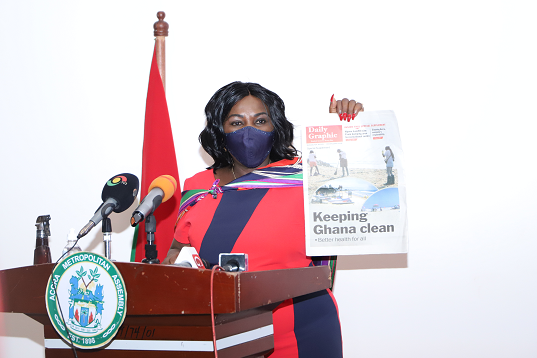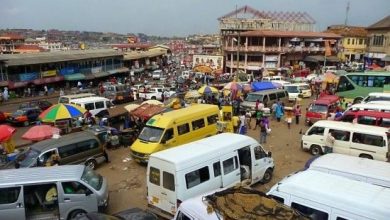News
Keeping Ghana clean: Name, shame, sanction

The Graphic National Sanitation Awareness Campaign has been launched in Accra, with a call for the strict enforcement of sanitation bye-laws and the naming and shaming of people who flout the laws.
These were the key recommendations by the various speakers at the launch on Wednesday.
They explained that the move would prevent the indiscriminate disposal of waste by unscrupulous people in the country.
The speakers were the Minister of Sanitation and Water Resources, Ms Cecilia Abena Dapaah; the Gbese Mantse, Nii Ayibonte II; the Accra Metropolitan Chief Executive (MCE), Mr Mohammed Adjei Sowah; the Managing Director of the Graphic Communications Group Limited (GCGL), Mr Ato Afful, and the Group Chairman of the Jospong Group of Companies and President of the Environmental Services Providers Association (ESPA), Mr Joseph Siaw Agyepong.
Background
The GCGL and its partners are determined to make the most out of the campaign to help make Ghana the clean country all are yearning for.
Having declared 2021 the “Year of Sanitation”, the company is focusing on efforts to whip up the citizenry to adhere to good sanitation practices.
The sanitation campaign is on the theme: “Keep Ghana Clean”.
Partners
The sanitation giant, Zoomlion Ghana Limited (ZGL), the ESPA and the Sanitation and Water Resources Ministry are partnering the GCGL in the campaign.
Minister’s charge
Ms Dapaah, who launched the national campaign, indicated that she had already given her full backing to metropolitan, municipal and district assemblies (MMDAs) to enforce sanitation regulations aimed at keeping the environment clean.
“As a nation, we cannot afford the high socio-economic cost of the poor attitude of some of the citizenry. For example, according to the Water and Sanitation Programme of the World Bank, poor sanitation costs Ghana over US$290 million annually.
“This sum is the equivalent of $12 per person in Ghana per year or 1.6 per cent of Gross Domestic Product (GDP),” she said.
Timely
Ms Dapaah said the Graphic Sanitation Awareness Campaign was very timely, as it would have a long-term, self-sustaining impact on the lives of the people.
Based on that, he commended the GCGL for such a well thought-out initiative.
She was of the conviction that the initiative would complement the ministry’s national sanitation campaign under the tag: “Sesa wo suban” or “Change your bad habit and play your part in cleaning the environment”.
While emphasising the importance of good sanitation, the minister said it had become a powerful driver of national economies and had, in no small way, impacted positively on health, education, the environment, local tourism, job creation, productivity and human development.
“Suffice it to say that if any country wants to develop, then such a country must take sanitation seriously, as it has the potential to propel growth in a sustainable manner,” she said.
Challenges
The minister said environmental sanitation challenges, if not addressed, would soon become endemic, hence the urgent need to decisively deal with them now.
Core among the challenges, she said, was the poor attitude of the citizenry.
“It is a common spectacle to see people throw refuse indiscriminately on the streets and open spaces and openly defecate into gutters, at the beaches, in the rivers and in the bush, without blinking an eye.
“You will agree with me that this attitude of not caring for our environment is not one of the core traits of any Ghanaian culture, tradition or belief,” she stated.
The challenges, she said, were self-inflicted and could be changed if everyone intensified his or her sensitisation activities.
MD gives details
The Managing Director of the GCGL said the sanitation awareness campaign would be a year-long affair.
“We will tour all the 16 regions of Ghana to organise sanitation dialogues and seminars and engage traditional rulers, key opinion leaders, schoolchildren and other citizens on the benefits of a clean environment. We will also recognise and reward the cleanest region,” he said.
Mr Afful said the modalities for the cleanest region competition would be published in the Daily Graphic and the other newspapers and online channels of the GCGL in the coming days.
He said keeping Ghana clean was everyone’s responsibility and, therefore, urged Ghanaians to embrace the campaign, since it was aimed at, among other things, ensuring that the people remained healthy.
“It is our expected outcome that Ghana will embrace this campaign and make it our own. This is a national campaign; it belongs to all of us and we need to commit to this community by community, district by district and region by region,” he said.
Chiefs involvement
For his part, Nii Ayibonte did not only call for the enforcement of the
laws on sanitation but also the imposition of fines on people who flouted those laws.
He said without sanctions, there was no way the country could achieve its clean environment agenda.
“This is because some people are very stubborn. When you tell them to use the dustbin, they don’t mind you but litter everywhere,” he said.
Nii Ayibonte underscored the need for everyone to come on board in the fight against indiscriminate waste disposal, since it was not the duty of the leadership alone.
“The President said he wants to make Accra the cleanest city, and once he has said that, it does not mean that he will come and clean up the city. It is our duty to help in the realisation of that goal,” he said.
He said to undertake environmental campaigns, there was the need to involve chiefs, who could mobilise the people.
He pledged his support for the Graphic sanitation campaign
Jospong on stakeholders
In his address, Mr Siaw said he was happy to be part of the initiative, which also fell in line with the operations of the JGC.
He said in spite of the fact that there was a problem with dealing with filth in the country, “the beauty of this is that we have the solution and it means that once you have a problem and a solution, you are on the way to making progress”.
In a presentation titled: “Keeping Ghana clean, the role of stakeholders”, he said everyone had a responsibility to ensure that he or she cleaned the environment.
Policy
Mr Sowah said the Accra Metropolitan Assembly (AMA) took inspiration from the National Environmental Sanitation Policy 2010 which captured about six thematic areas to be followed.
The policy, he said, made mention of, among other things, cemetery management, drains management, the greening of public and open spaces, animals straying into communities, liquid waste and solid waste.
He said the issue of sanitation was everybody’s business, since it affected everyone, adding that accountability should be demanded from everyone.
“When it comes to sanitation, it is not one-sided; it’s everybody’s matter, hence we do not think that demanding accountability from leaders alone will yield the desired results. We should demand accountability from all and sundry, from even the individual who litters the streets. Naming and shaming should be the order of the day,” he emphasised.
Source:Fiilafmonline/Graphic



